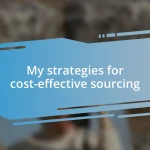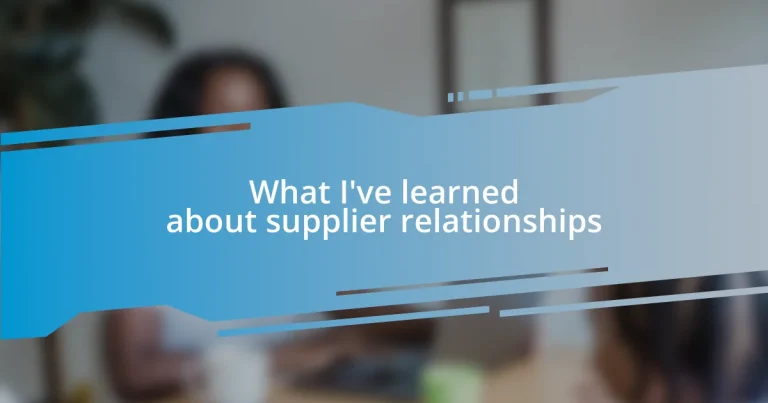Key takeaways:
- Strong supplier relationships enhance business success through improved communication and collaboration, transforming challenges into opportunities for growth.
- Building trust with suppliers involves consistent communication, reliability, and transparency, fostering loyalty and enabling creative problem-solving.
- Regular performance evaluations and empathetic conflict resolution are essential for nurturing long-term partnerships, emphasizing mutual growth and accountability.
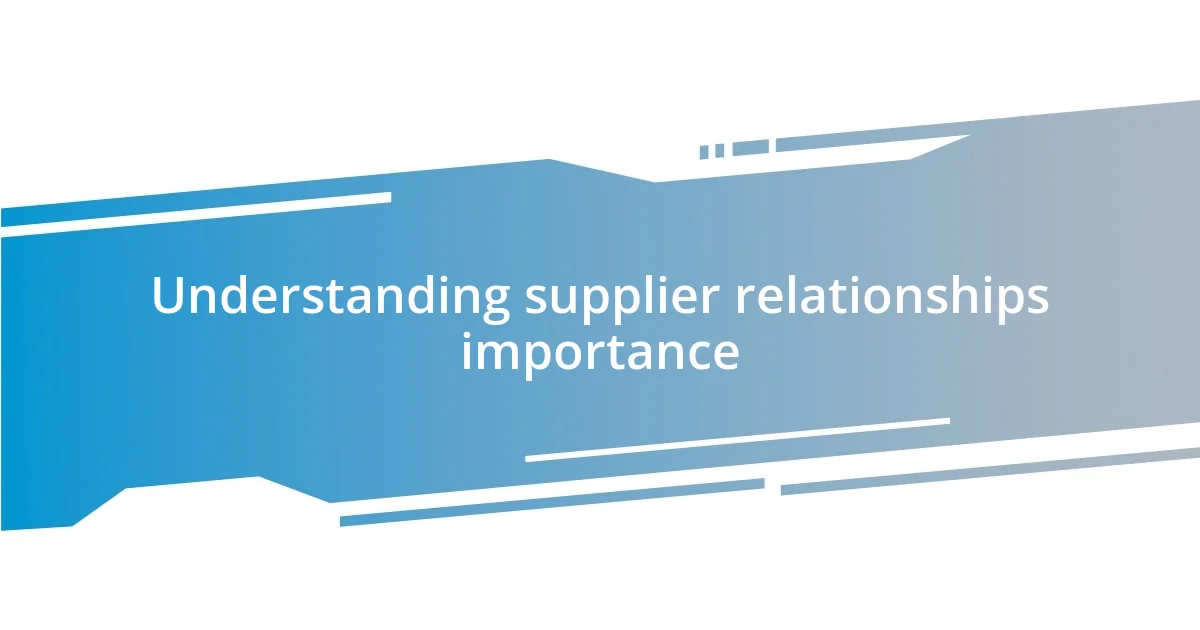
Understanding supplier relationships importance
One of the most valuable lessons I’ve learned over the years is how vital strong supplier relationships are to a business’s success. Think about it: have you ever faced a delay because a supplier missed a deadline? It can be incredibly frustrating. When you foster good communication and trust with suppliers, those hiccups often transform into smooth collaborations, ultimately benefiting everyone.
There was a time when I was juggling multiple projects and relied heavily on a supplier who had my back. They understood my needs and went the extra mile to ensure timely deliveries, which not only saved me from potential crises but also built a strong partnership. This experience taught me that investing in these relationships can lead to invaluable support when challenges arise.
Ultimately, viewing suppliers as partners rather than mere transactional entities can dramatically change the way a business operates. Have you ever considered how a single point of contact can streamline your processes? By nurturing these connections, you can turn potential obstacles into opportunities for growth, making the entire supply chain smoother and more efficient.
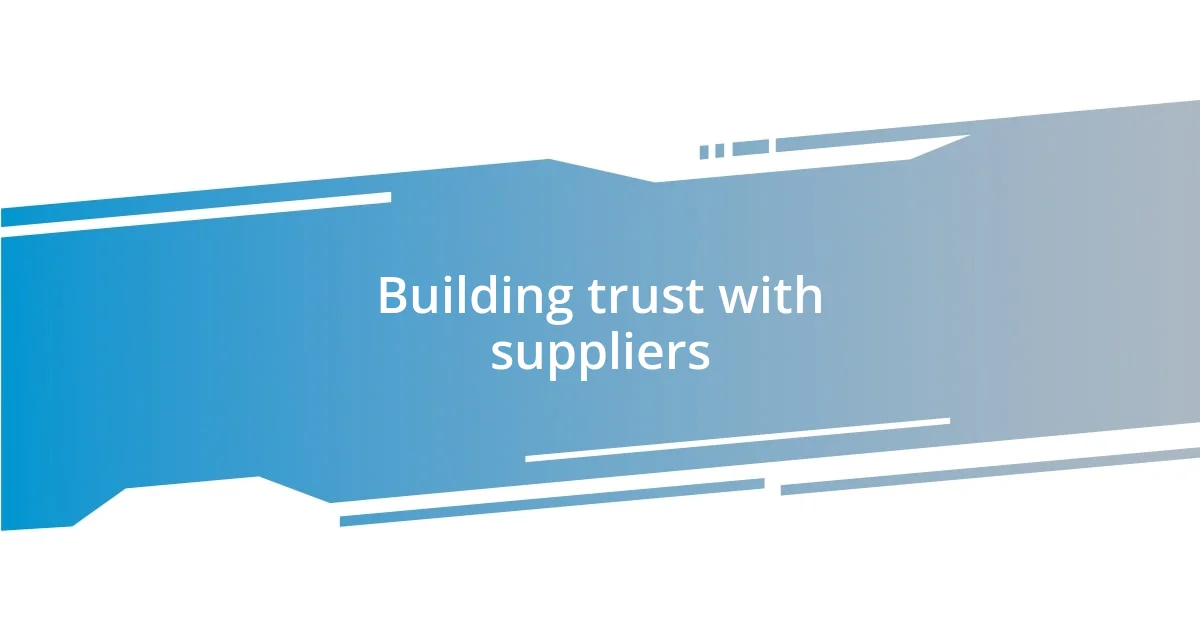
Building trust with suppliers
Building trust with suppliers involves consistent, open communication. I remember a situation where a minor misunderstanding about an order could have escalated into something major. Instead, I proactively reached out to my supplier to clarify the details, and this small step reinforced our relationship. Just like any relationship, honesty is crucial; when suppliers know that you’ll communicate openly, they’re more likely to reciprocate.
Another key aspect to building trust is reliability. During a particularly busy season, I made a point to touch base with my suppliers regularly. It wasn’t just about checking on deliveries but also about showing appreciation for their hard work. This simple act of recognition often led to better service and loyalty because the suppliers felt valued. Trust grows when both parties know they can depend on each other, and that’s something I strive for in every interaction.
Lastly, I’ve learned that showing vulnerability can be a strength. There was a time I faced unexpected budget cuts that affected our orders. I decided to have an honest conversation with my supplier about this challenge. To my surprise, not only did they offer flexible solutions, but it also deepened our relationship. They appreciated my transparency and were willing to work with me, proving that building trust often begins with being open about one’s own challenges.
| Aspect | Approach |
|---|---|
| Communication | Establish consistent, open dialogue with suppliers to foster transparency. |
| Reliability | Regular check-ins and appreciation can help solidify the partnership and build loyalty. |
| Transparency | Be open about challenges, leading to creative solutions and deeper relationships. |
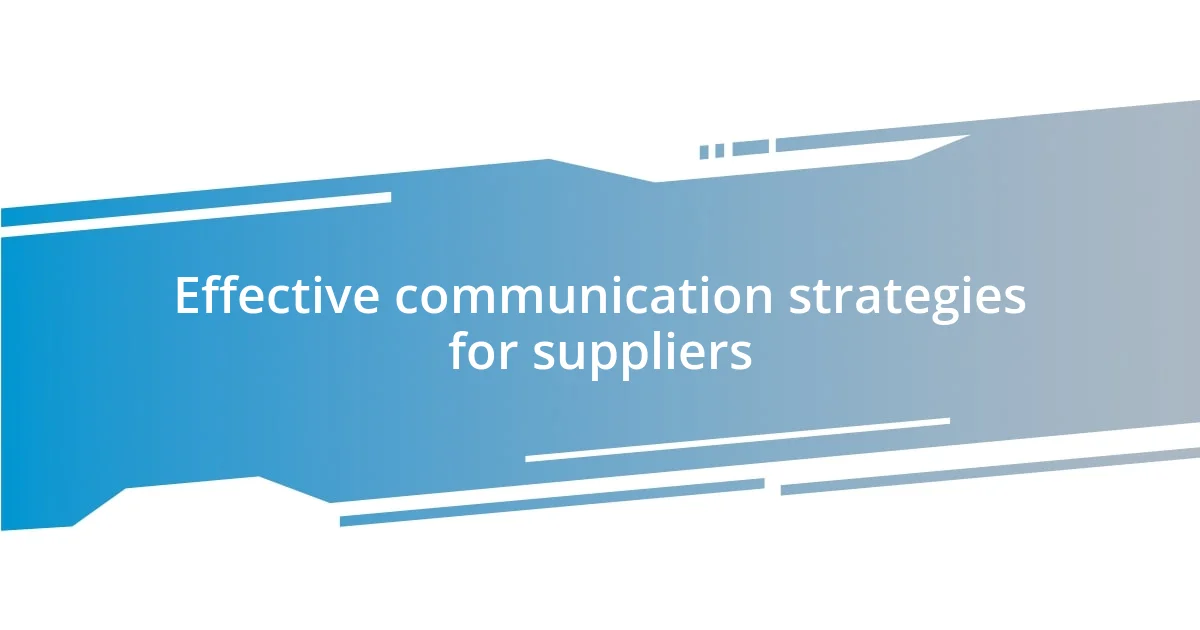
Effective communication strategies for suppliers
Effective communication isn’t just about exchanging information; it’s about creating a connection. I vividly recall an instance where a supplier needed clarification on a complex order. Instead of sending a quick email, I opted for a phone call. The conversation allowed us to discuss nuances and build rapport, leaving both parties feeling heard and understood. That experience taught me that the medium of communication can significantly impact the relationship.
Here are some effective strategies to enhance communication with suppliers:
- Choose the Right Channels: Utilize methods that suit both your style and your supplier’s. Whether it’s emails, calls, or face-to-face meetings, the right choice can make all the difference.
- Encourage Open Feedback: Create an environment where suppliers feel comfortable sharing their thoughts. I’ve found that asking for feedback not only improves processes but also strengthens trust.
- Regular Updates: Keep your suppliers in the loop about schedules and changes. One time, I shared a detailed production timeline, which helped my supplier adjust their schedules and ultimately ensured timely deliveries.
This holistic approach to communication fosters long-lasting partnerships, paving the way for smoother collaborations and mutual growth.
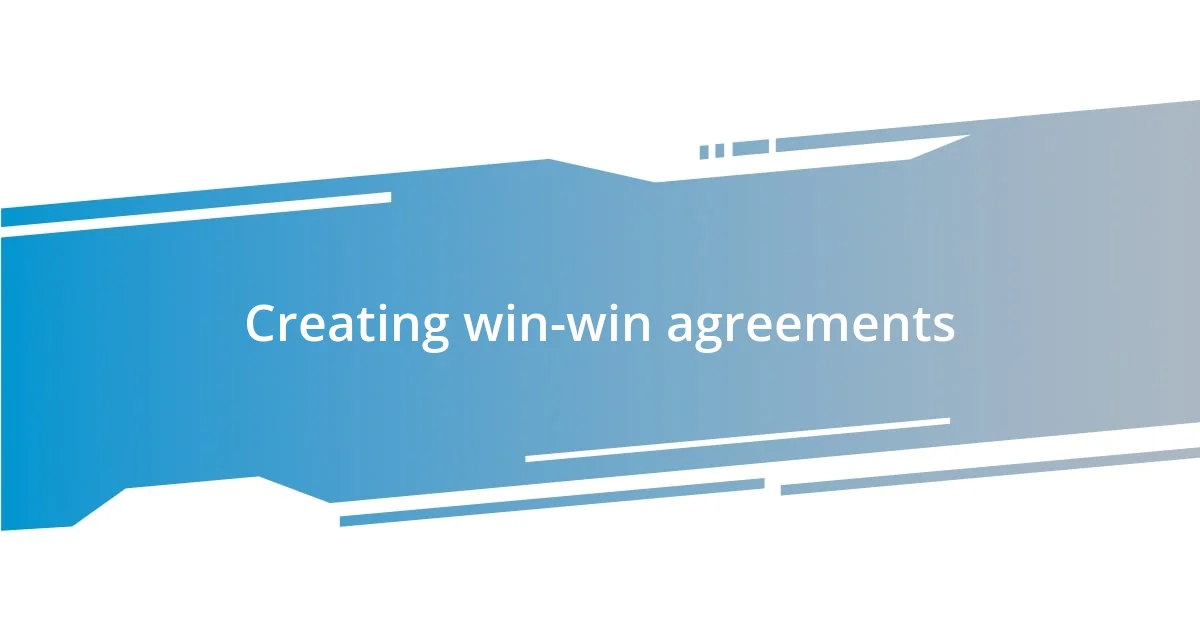
Creating win-win agreements
Creating win-win agreements starts with understanding each party’s needs and interests. A few years ago, I found myself negotiating a contract that included a price increase from one of my suppliers. Instead of reacting negatively, I asked them to share their perspective. This conversation revealed their rising operational costs, and in turn, we explored other areas where we could increase efficiency. By focusing on mutual benefit, we crafted an agreement that allowed both sides to thrive.
It’s fascinating how little shifts in conversation can lead to significant outcomes. I recall a situation where I needed faster delivery schedules. By presenting my request as a challenge we could tackle together, rather than a demand, my supplier felt empowered to find a solution. The ultimate agreement not only met my timeline but also provided them with a chance to innovate their shipping process. Doesn’t it feel great when both sides walk away feeling like they’ve gained something?
I truly believe creativity is key in these agreements. In one instance, rather than simply negotiating discounts, I proposed a partnership for joint marketing efforts that would benefit both our businesses. This allowed my supplier to gain exposure in my network, while I benefitted from their added sales incentive. Reflecting on this experience, I realized that when we align our goals, everyone wins. It’s about crafting solutions that are more than just transactional; they should be transformative for both parties involved.
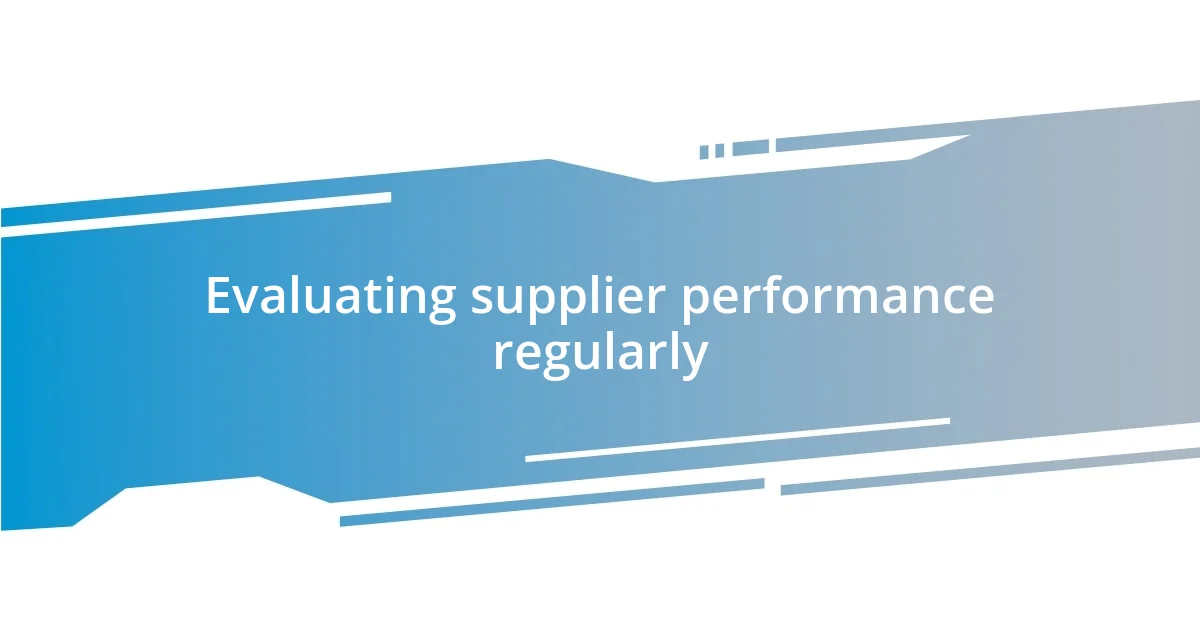
Evaluating supplier performance regularly
Evaluating supplier performance regularly is crucial for maintaining strong partnerships. I remember one time when I decided to implement a quarterly review process with my key suppliers. Initially, it felt daunting, but the insights we gained were invaluable. By monitoring metrics like on-time delivery and quality consistency, we were able to identify trends that helped both parties improve. Have you ever noticed how small adjustments can lead to significant changes in outcomes?
Additionally, I’ve found that engaging suppliers in the evaluation process fosters a sense of ownership. During one of our reviews, I shared a growth opportunity I spotted, and to my surprise, my supplier had already devised a plan to address it. This collaborative approach not only nurtured our relationship but also encouraged transparency. It’s amazing how a simple conversation about performance can lead to mutual growth and innovation, wouldn’t you agree?
I also believe that regular evaluations create accountability. When I established a feedback loop, it opened up channels of communication that weren’t there before. For example, one supplier expressed concerns about my order forecast accuracy. Instead of brushing it off, we worked together to refine the process, which ultimately led to better inventory management for both of us. This ongoing dialogue has been a game-changer, reinforcing the idea that performance evaluations are not just about metrics—they’re about building a partnership that thrives on continuous improvement.
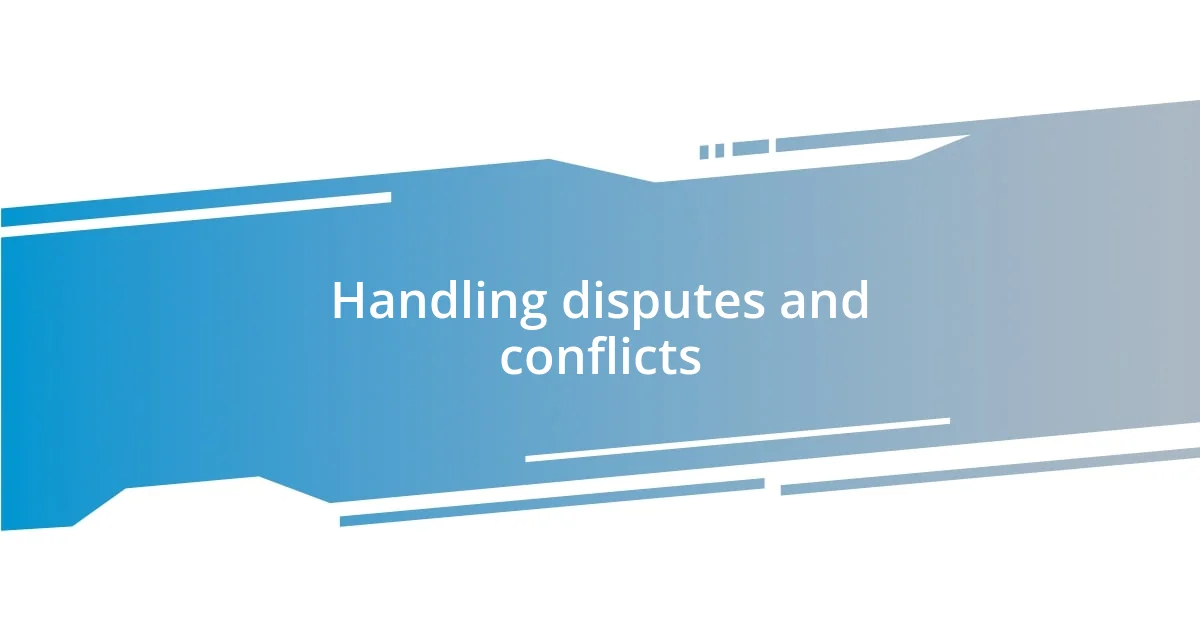
Handling disputes and conflicts
Navigating disputes is part of the journey in supplier relationships, and I’ve found that staying calm can make all the difference. I remember a tense situation with a supplier over a missed shipment. Instead of letting frustration take over, I decided to approach it with understanding. I asked them what happened, and they revealed a staffing issue that had gone unnoticed. Opening that door led to a solution that not only rectified the immediate problem but also strengthened our communication moving forward.
I’ve learned that addressing conflicts openly can prevent them from escalating. For instance, during a regular check-in, I noticed a supplier seemed hesitant about a new project. Instead of plowing ahead, I took a moment to ask if there were any concerns. This conversation uncovered underlying fears regarding resource allocation on their end. Addressing those fears together not only saved us time but also deepened our trust. Isn’t it incredible how a simple question can lead to a breakthrough?
Emphasizing empathy can transform a conflict into an opportunity for growth. In one case, a supplier and I disagreed on the quality of a batch of materials. Instead of pointing fingers, I invited them to revisit the samples with me. We discovered a miscommunication had led to the issue. This collaborative approach not only resolved the immediate dispute but also strengthened our bond. After that experience, I realized that sometimes the best path forward is to step into each other’s shoes—what better way to foster a lasting partnership?
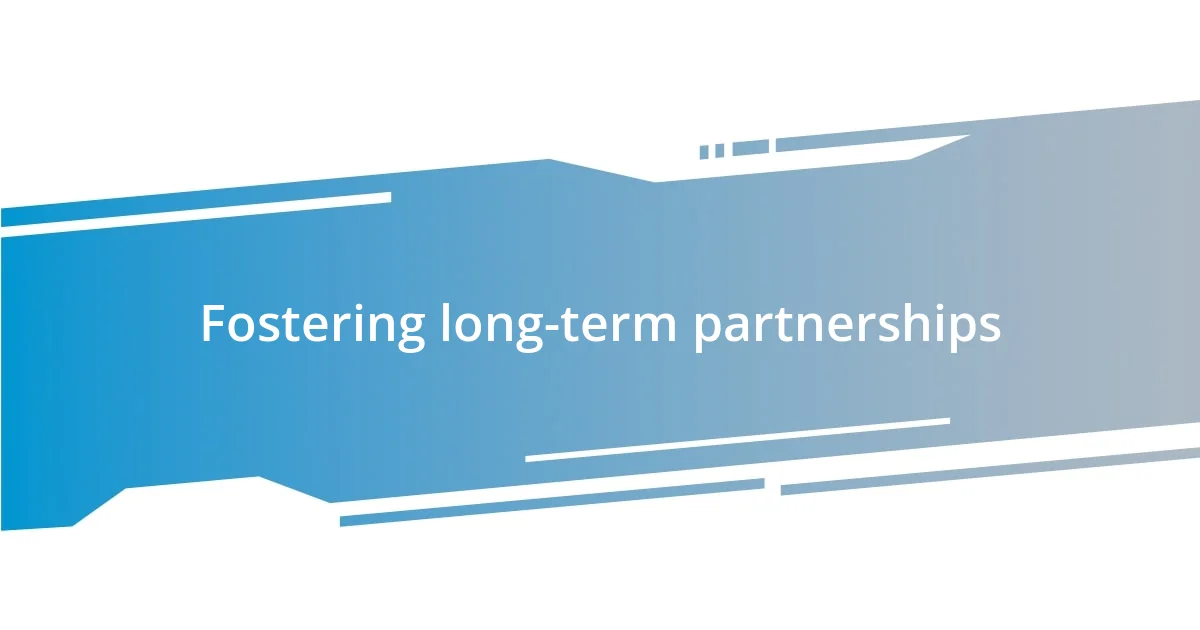
Fostering long-term partnerships
Building long-term partnerships requires consistent efforts and a shared vision. I recall a time when my team and I organized a joint brainstorming session with one of our suppliers to explore future innovations together. It was enlightening! They brought ideas to the table that we hadn’t even considered. This kind of collaborative atmosphere not only fostered creativity but also solidified our relationship as we navigated challenges as one team. Have you ever experienced a breakthrough moment when working side by side with a partner?
Another key factor in nurturing these partnerships is transparency. There was an instance when I chose to share our company’s upcoming changes openly with a supplier. Initially, I hesitated, fearing it might create unpredictability, but their reaction surprised me. They expressed gratitude for the insight and offered suggestions on how to adapt. This openness not only showcased trust but also positioned us to tackle future challenges together. How refreshing to know that vulnerability can lead to stronger bonds!
Lastly, investing in relationship-building activities can pay off significantly. I remember hosting an informal dinner with a few key suppliers to celebrate our successes. It was one of those low-pressure environments that allowed for genuine conversations. As a result, we learned about personal interests and common goals beyond the professional realm. This simple act humanized our interactions and transformed our partnership from a transactional one to a more personal connection. Isn’t it interesting how a meal can foster deeper engagement and loyalty?





